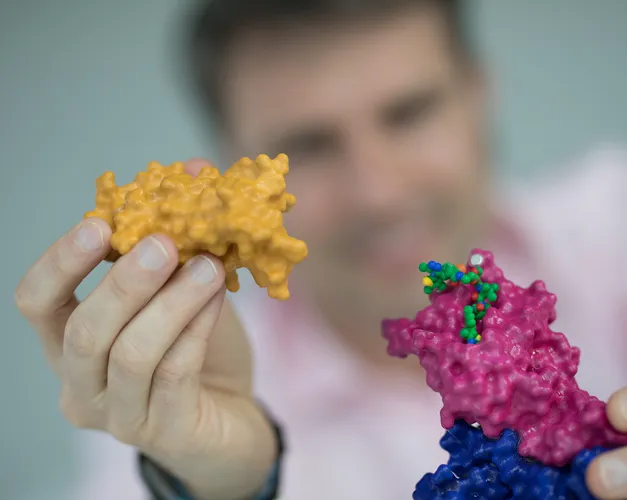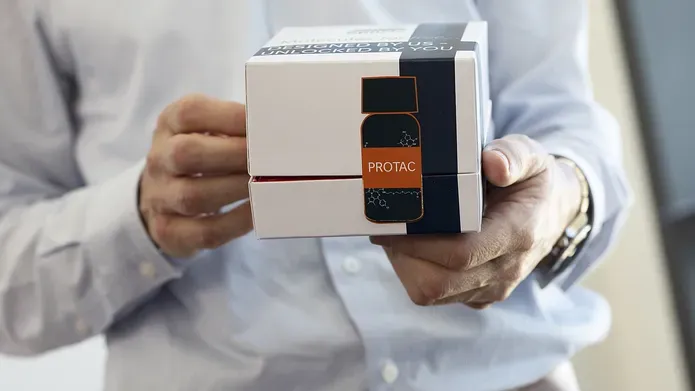Feature
Drugging the undruggable - protein degradation technology that is revolutionizing drug design
Dundee is front and centre of a revolution in drug design.
Published on 10 June 2021


PROTAC compounds developed at the University of Dundee are now being made available free of charge by BI
Targeted protein degradation is an entirely novel approach that provides hope of treating diseases previously thought to be undruggable. This technology co-opts the cell’s natural disposal systems to remove disease-causing proteins. It is applicable to diverse therapeutic areas including oncology, dermatology, immunology and respiratory diseases.
The groups of Professors Alessio Ciulli, Satpal Virdee and Gopal Sapkota have developed new approaches to harness these natural disposal systems. These potentially open up many new areas of disease biology research and unlock therapeutic strategies against a whole range of human proteins in an equally diverse range of human diseases.
Professor Ciulli has pioneered the development of proteolysis-targeting chimeras (PROTACs). PROTACs are two-headed molecules, where one end binds to a target protein of interest, while the second engages an E3 ubiquitin ligase – a class of enzymes involved in tagging substrate proteins as a natural mechanism to induce their degradation. The first crystal structure of one of these interactions was solved by Ciulli in 2017.
Ciulli has revealed fundamental insights into the working of the degrader molecules that he designed. These and other discoveries have led to significant partnerships with some of the world’s largest pharmaceutical companies including Boehringer Ingelheim.
Darryl McConnell, Senior Vice President and Research Site Head Vienna at BI
Amphista Therapeutics, the University of Dundee spin out founded by Ciulli in 2017, recently received a near-£40 million investment to further its work developing a new protein degrader platform. It has been earmarked as one of Scotland’s ‘futurecorns’, fast-growing firms set to achieve the all-important $1bn valuation.
Professor Gopal Sapkota has developed an Affinity-directed PROtein Missile (AdPROM) system that allows for rapid and efficient destruction of target proteins in many cells. AdPROM uses small antibodies, or molecules that mimic them, to bind to disease proteins while also binding an E3 ubiquitin ligase to target the protein for degradation. A collaboration with the Division of Signal Transduction Therapy and the groups of Ciulli and Dr Ian Ganley has resulted in the development of a next generation chemically tunable AdPROM system that could be applied to any target protein. For example, the Sapkota group has applied this technology to destroy K-Ras, the most prevalent oncogene in human cancer. K-Ras had been considered undruggable since no therapies targeting it have been developed despite decades of research.
One current limitation to this research is the incomplete information available on which E3 ubiquitin ligases are active in which diseased cell types and that therefore can be harnessed for targeted protein degradation. To address this, Professor Satpal Virdee has developed the first class of activity-based probes that can identify active E3 ligases. This technology has determined that an E3 ubiquitin ligase called MYCBP2 is involved in the self-destruction of axons after injury. As nerve injury occurs in the early stages of many neurodegenerative diseases and after cancer therapy, blocking MYCBP2 enzyme activity might prove an effective strategy for treating a range of diseases and neuropathies.
For further information or to engage with our research, please contact: